|

|
| One of our "plantations" |
GOING BANANAS!
I may have mentioned the American, John Enright, who
started a project that helps small-scale farmers to grow bananas. 1 Hectare should make between $20,000 - $40,000 a year,
once it's up and running and the idea is that the farmer makes more than he ever believed possible and 50% goes back into
community work.
Well, we set out to get 20 Hectares going in Misundu. John warned
us that he would help wherever he could and he has done so. We managed to get several hectares of bananas planted and they
propogate quite quickly so we should eventually achieve 20 Hcts and more; however, he had no money for irrigation systems
or pumps.
|
|
ORPHANAGE
Sal continues to get in support for the orphanage.
Every month, there's a period where she goes around paying bills for them, hauling maize for grinding and picking up donations
& deliveries. It's steaming hot. Our car A/Cs died some time back and we don't have the money to repair them. So poor
Sal comes back hot, exhausted and totally dehydrated! But she was telling me today how the kids have got to recognise the
sound of the Hilux and come running out to see her, wanting to be held and to get attention. It all makes it worthwhile.
OUR FARM
On the farm, we have been really fortunate to get the services
of a pretty good Agriculturalist. We are growing a very wide variety of things. This partly because we use all kinds
of things for us and the workers, partly to make an income (which is tiny!) and also because we are experimenting.
The idea is to see what grows and what sells and to teach
people in the community. They call them "demonstration gardens" but, apart from the practical side of it all, I think of them
as a whole lot of fun. Always loved experimenting.
We are growing herbs, vegetables and some
unusual things:

Castor oil trees - the oil
is apparently used for delicate mechanisms such as watches
Jatropha - oil from the seeds
can be turned into diesel, insect repellant lamp oil and a kind of antiseptic soap
Artemesin - this is amazing
stuff. You make a herbal tea and it wipes out malaria. I've used it on myself and the workmen. I think it works better than
manufactured medicines but I'm not a doctor...
A special variety of Aloe Vera - you make
a drink out of the pulp and it is as effective (apparently) as the best ARVs against HIV without all the side affects. It so boosts your immune system that
it wipes out TB as well. I've seen the results on someone I know. Looks pretty impressive to me.
We have also started making some cheese,
yoghurt, mayo and hamburgers and selling in town. All very small scale and experimental but it's paving a
pathway that could be scaled up.
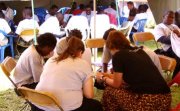

YOUTH WORK We've created an
organisation for the local youth who began with a mixture of wrong motives. Numbers dwindled down and has started to
pick up again as we have persevered. In fact we are drawing in youth from all kinds of different groups - like an area
of 20 km radius. Some are from villages, some from the city, some from the squatter township and some from the farming
community.
We bring in people to teach them stuff like, discovering
your talents, changing mindsets, leadership skills and we are getting a couple of projects going for them - pig rearing, agriculture
and sewing.
Around mid 2006, they put on a great show for some friends
who came to visit - traditional dancing, plays, poetry and singing. It was held in a simple, run-down community hall but we
loved it and so did they.
We started to make up a club house for them and I have
a couple of computers I can put in there for them.
EXPLORING THE AREA & RESOURCES
At the beginning of 2006, I
felt I should go out and explore this area. Over time, I collected various maps -contours, roads, farm estates and satellite
photos. I've gradually worked these up and included communities and resources.
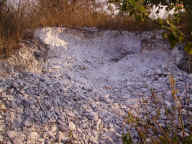 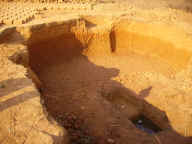 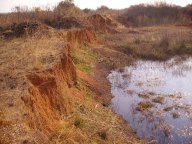
Around March, I sent out questionnaires to the youth. It
required them to take a good look at themselves - their talents skills and abilities, problems dreams and aspirations. It
also asked them to look around them at what people were doing and the natural resources. How can you start thinking about
doing anything in the community unless you know what you have?
That was a really wonderful excercise and it opened my
eyes to a great deal. Some of those kids really opened up their hearts and I'll tell you, it was moving stuff. So
much hope... so much opportunity... so many hurdles to unlocking them.
I toured around with a couple of them and discovered hidden
resources all around us - lime, flagstone, laterite (used for building roads and blocks) and clay quarries, black river
soil, bamboo and pine forests. The clay is an attractive creamy yellow material and dries solid in the sun.
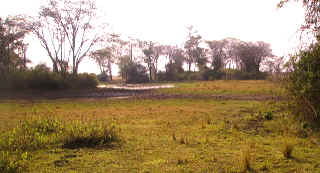
|
| Just a small part of the "Park Area" |
FISH FARMING
There's a beautiful wide area where the water is just below
the surface and is exposed in ponds where the ground dips down. Grass grows year round and cattle grazing gives the impression
of an English Parkland with overtones and birdlife of Africa. I toured the area
with the son of a friend of ours. Jim Thompson lives in the states and lectures to businessmen at an Ivy League University. He
finds funds for projects in the third world and was open to getting some fish farming going. He has access to the foremost
fish-farming experts in the world. This area would be ideal. However, we need to get something more established going first
- for example, if the banana project reached a level of maturity, that would encourage the investment and expertise.
Fish farming can bring in around $50,000 per Hectare a
year and the market seems wide open. If only we could get this going on the same basis as the bananas it could create a good
funding stream for community work.
THE VILLAGE UP THE ROAD
Sal managed to get a couple of sewing machines donated
and we will start with a ladies group in the nearby village of Maria Chimona. They've received tailoring training but haven't
been able to buy the machines. We will see how they do with one first.
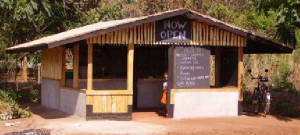
COMMUNITY SHOP
Esther is a Zambian lady who lives just behind us and is
involved in helping to lead the youth. We built a "Kantemba" (or shop) on the road just outside our place for her and she
has just started using it. It's a rough structure but it's the best I've seen. She sells her own stuff and will be selling
some of ours too.
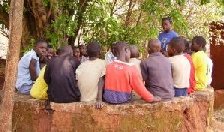
|
| Sunday School |
OTHER ODDS & ENDS
Our three "adopted" youth (Gabby, Jane and Suzie) are growing
and developing. It's been so wonderful to watch Suzie (aged 16) improving by leaps and bounds at school and growing
in self-confidence to the point where she is leading Sunday School with young kids from the township who come over to us each
week.
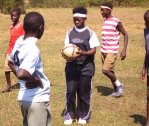
|
| Suzie (holding ball) & kids from Chipulukusu |
We now support 6 kids through school (including Gabby
& Suzie).
Sal made it a personal crusade
to save the life of one of our workers daughters. Doris was dying from HIV -
she could have many years of quite normal life with the right treatment and care but she wasn't getting either. She looked
like a concentration camp victim and it's been a battle over several months to get her to stabilise - it's so good to
get to a point where serious symptoms are disappearing completely and she's getting better.
|



